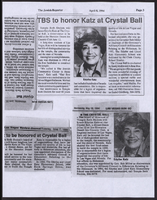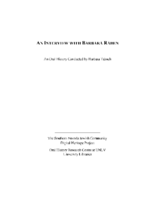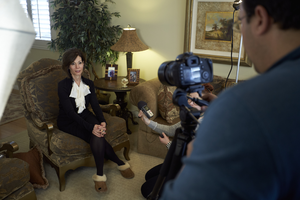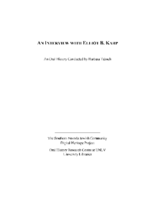Search the Special Collections and Archives Portal
Search Results

Transcript of interview with Ellis Landau by Barbara Tabach, November 28, 2017
Date
Archival Collection
Description
In 1990, Las Vegas became home to Ellis Landau and his attorney wife, Yvette. They moved from Phoenix, Arizona when Ellis accepted a position as Executive Vice President and Chief Financial Officer with Boyd Gaming. The relocation also included a desire to become active in the local community. Temple Beth Sholom was one of their first connections. For Ellis the Jewish community of a newer city like Las Vegas differed immensely from his childhood upbringing in a more ethnic Jewish community outside Philadelphia. Nevertheless, Ellis soon became active on the Temple Beth Sholom board, and is a past Treasurer and President. The couple are among the founders of the Warsaw Memorial Garden at the synagogue. In 2006, Ellis was honored as Temple Beth Sholom’s “Man of the Year.” The Landaus have been significantly involved with other local organizations such as Nathan Adelson Hospice and the Las Vegas Philharmonic. Ellis’s dedication to the Anti-defamation League, both on a local and regional level, is a beacon of inspiration to others. The Landaus are sponsors of ADL’s “No Place for Hate” program. Ellis is a graduate of Brandeis University in economics and has a Masters of Business Administration from Columbia University School of Business. His former career steps include Ramada Inc. and U-Haul Corporation.
Text

Transcript of interview with Valerie Wiener by Barbara Tabach, January 20, 2015
Date
Archival Collection
Description
Valerie Wiener is an accomplished state senator, business owner, president and founding member of the Public Service Institute of Nevada and the Valerie Wiener Foundation. She was born October 30, 1948 in Las Vegas, Nevada. Her service as senator for 16 years and her role as a public servant led her to become the first woman assistant majority leader of the state senate in Nevada. She graduated with a bachelor degree of Journalism at the University of Missouri/Columbia within the School of Journalism earning a Masters of Arts in Broadcast Journalism and a Master of Arts in Literature at the University of Illinois in Springfield while attending law school at McGeorge School of Law in Sacramento in the 1970s. Her generosity is also seen through scholarships and activities at the Louis Wiener Jr. Elementary School. In addition, Valerie is a professional speaker, consultant, and internationally published author. She is the recipients of many awards, such as: ?Women of Achievement Award? in Media; ?Healthy Schools Heroes?; ?Public Affairs Champion Award?; ?Legislator of the Year?, and the Nevada Secretary of State?s recipient of the ?Jean Ford Participatory Democracy Award.? She stays active through her commitment to the Nevada Senior Olympics for both Fitness and Weightlifting earning 17 gold medals from 1998 to 2007. In this interview, Wiener discusses her childhood and being raised in Las Vegas in the 1950s as well as the academic path that led her career into politics. She shares memorable insight into the life of her father, Louis Isaac Wiener, Jr., an accomplished attorney and business man who represented the infamous Benjamin ?Bugsy? Siegel during the construction and opening of the Flamingo Hotel and Casino in 1946. Throughout Wiener?s interview, she highlights the traditions of the small, but growing Las Vegas Jewish population in the 1960s. Among the people she recalls most vividly is her grandmother Kitty Wiener. Wiener also discusses her community service work and her life mantra of giving.
Text


Transcript of interview with Roberta Kane by Barbara Tabach, September 6, 2017 and May 22, 2018
Date
Archival Collection
Description
Roberta “Bobbie” Kane (1932 - ) is the first known Jewish child born in Las Vegas. Her parents, Sallie and Mike Gordon, were liquor stores owners and among the founders of the first Jewish congregation in Las Vegas. Bobbie’s childhood remembrances are as a young girl who was fully aware that “Friday nights were reserved for religious services. Saturdays were always reserved for gin rummy.” In the late 1940s, as a teenager at Las Vegas High School (and 1950 graduate), Bobbie recalls Las Vegas as a small town and a joyful place to grow up. She briefly attended University of Southern California before marrying and beginning her family. In time, life brought her back to live with her parents. She pursued a career working for the Desert Inn group of hotels and helped open the Stardust in 1957. She was mentored by Mark Swain, “a six foot-four hunk of a cowboy” who worked for Moe Dalitz. This experience included driving Mark’s pink Cadillac to pick up hotel guests. This provided her with a
Text

Transcript of interview with Barbara Raben by Barbara Tabach, February 24, 2015
Date
Archival Collection
Description
Interview with Barbara Raben by Barbara Tabach on February 24, 2015. In the first part of the interview Raben discusses her involvement with Hadassah in Southern Nevada, and the various groups within that organization. During the second part of the interview, she talks about her family and her relationship to Judaism, and moving to Las Vegas in 1991. Raben discusses the business she built in Los Angeles and Las Vegas called the Candy Factory. She then talks about the formation of Midbar Kodesh with other families from Temple Beth Sholom. Raben continues to be involved in the Jewish community and the Jewish Family Service Agency.
In 1945, Barbara Raben was born to Kermit and Adele Shulman, children of Eastern European emigrants. She enjoyed a happy childhood in Stamford, Connecticut, and was raised with a strong Jewish identity. After attending college in New Jersey, Barbara married Richard Grisar, and the couple lived in London for a year, before returning to Stamford. In 1975, Barbara and Richard moved to Los Angeles where Barbara owned and operated a very successful candy business, Candy Factory. Sixteen years later, Barbara sold her business, and the family relocated permanently to Las Vegas, where her husband owned radio stations. Barbara has always been an active member of the Jewish community, wherever she lived, giving her time to synagogue, children's day school and service organizations. Upon arriving in Las Vegas, Barbara and her family were members of Temple Beth Sholom, before leaving the congregation to start Midbar Kodesh Temple with a small group of other families. She has been an active member of Hadassah Southern Nevada Chapter for over a decade, helping rebuild the organization locally after participating in the Hadassah Leadership Academy, a program designed to engage a younger generation of members. Currently, Barbara serves as board president and interim executive director for Jewish Family Service. In 2004, then a widow, she married Terry Raben. Barbara has four sons with her first husband: Michael, Andrew, David and Marc Grisar.
Text
21st Century USA If We're Going to Play the Futures Game, What Happens Tomorrow is Based on What Happens Today by the League of Women Voters Education Fund, 1973
Level of Description
Archival Collection
Collection Name: Ardis Kearns Papers
Box/Folder: Box 16
Archival Component
Promotional material for Makers: Women in Nevada History PBS program; NEW Leadership Development information including: planning, communication, memoranda, program guidelines, event schedules, brochures, 2010-2015
Level of Description
Archival Collection
Collection Name: Women's Research Institute of Nevada Records
Box/Folder: Box 06
Archival Component

Photograph of Marla Letizia, Las Vegas (Nev.), March 02, 2017
Date
Archival Collection
Description
Longtime Las Vegas resident and Jewish community member Marla Letizia is interviewed at home for Jewish Family services.
Image
Mayor C. D. Baker at a dinner meeting of Business and Professional Women Clubs in the Thunderbird Hotel: Mary Jane DeCrane; Loraine Frankovich; Freda Dickson; Dorothy Brimacombe; Geri Palmeri; and Jane Lopez, 1959 March
Level of Description
Archival Collection
Collection Name: C. D. Baker Photograph Collection
Box/Folder: Folder 02
Archival Component

Transcript of interview with Elliot B. Karp by Barbara Tabach, December 17, 2014
Date
Archival Collection
Description
Interview with Elliot B. Karp by Barbara Tabach on December 17, 2014. In this interview, Elliot Karp discusses growing up in a culturally Jewish household in New York and becoming more observant in his teenage and college years. He decided, after a trip to Israel and a year in a rabbinical program, that he wanted to be a "Jewish professional" with a focus on social work and community organizing, and attended a Master's program at Brandeis University. Karp goes on to talk about his work for the Jewish Federation in Ohio and Pennsylvania, and being recruited to come to Las Vegas. He talks about the challenges in the Las Vegas Jewish community and the Jewish Federation's role as an umbrella organization to partner with other agencies to grow and sustain a robust Jewish community in Southern Nevada.
On October 6, 1955, Elliot Karp was born in Mineola, New York to parents of East European heritage who identified as culturally Jewish. As a teenager, Elliot felt the calling to become kosher, balancing this practice with household norms that were not as strict. He eventually became shomer Shabbat just after enrolling at State University of New York at Stony Brook, where he majored in Political Science. After graduating from SUNY, Elliot spent a year living in Israel considering a path in rabbinical studies. By the end of his time, he decided on a different, yet related path, and registered as a graduate student in Brandeis University's School of Jewish Communal Service, on fellowship from Council of Jewish Federations. After graduating, Elliot moved to Columbus, Ohio to work for the Jewish Federation, focusing on fundraising, but was exposed to many different operational areas of the organization. After three years, Elliot was recruited to the Philadelphia office as its director of leadership development. He then left the Federation to work in development at Brandeis University, but after two years, returned to the Federation as the Cincinnati office's chief development officer. In 2008, Elliot received a call to take his highly cultivated leadership and fundraising skills to another Federation office: Las Vegas. After much consideration, he took the job - and challenge - as the office's new chief executive officer. Since then, Elliot has done much to promote communication, coordination and collaboration within the local Jewish community and beyond, through relationship building and successful fundraising efforts. His ultimate desire is to expand funding for programs that get more people involved in Jewish life - while also empowering community members define what a Jewish life means for them.
Text
